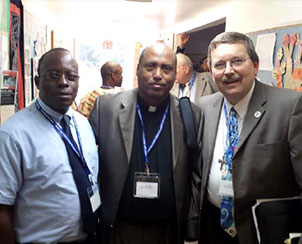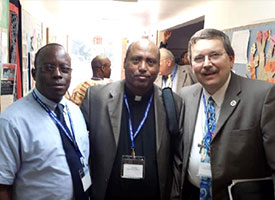African-immigrant leaders in The Lutheran Church—Missouri Synod came together at their first-ever national conference Aug. 9-11 in Bowie, Md. — adopting bylaws and a strategic framework for their outreach ministry and electing its officers, under the theme “Holding Together in Unity for the Kingdom’s Work.”

More than 100 people attended the conference, which launched the new “African Lutheran Mission in the Americas,” or ALMIA — a mission organization that’s intended to equip, train and strengthen existing African Lutheran congregations as well as to plant, in cooperation with LCMS districts, new churches in the United States and Canada. The meeting was sponsored by the Synod’s Office of National Mission and the LCMS Southeastern District.
The new organization continues the work of the former African Immigrant Mission of North America, which has reached out to African immigrants with the Gospel since 1996.
Elected as ALMIA officers were:
- Rev. Dr. Getachew Kiros of Los Angeles, president.
- Rev. Philip Saywrayne, Staten Island, N.Y., vice-president.
- Magdalene G. Harris, North Potomac, Md., secretary general.
- Philip Gai, Ontario, Canada, assistant secretary.
- Joseph Lavela, Hyattsville, Md., treasurer.
- Rev. Demelash Oumer, St. Paul, Minn., chaplain.
- Rev. Suah S. Deddeh, Landover Hills, Md., public relations officer.
The officers were installed during the conference.
In his presentation on “Becoming a self-sustaining, generous and missional congregation,” the Rev. David Kim said “immigration or migration is not accidental” but is part of God’s plan for salvation, so He will provide the needed resources “to accomplish [His] mission.” Kim is mission director for LINC Houston, and founder of Glocal Mission, Houston.
“The trouble with any church is not lack of money,” Kim said, but rather “it is lack of mission mindset/DNA, faith/trust in the Lord and creativity.”
Kim said “stewardship without mission is unnecessary, and mission without stewardship is impossible,” and he described successful fundraising as a combination of “faith-raising, people-raising and mission-raising.”
“The challenge of funding missions and ministries is everywhere, and among African-immigrant churches this is not an exception,” he said. “God’s people and leaders need to learn where they can find the resources to carry out God’s kingdom vision and mission. In the midst of all the challenges and uncertainty, there’s one premise that stands true: Where God leads, God provides.”
The Rev. Quentin Poulson, director of urban and inner-city mission with the Synod’s Office of National Mission and liaison for ethnic ministries, spoke about the blessings of congregations that serve urban, ethnic ministries.
Poulson cited 2010 census data, including that 80 percent of the U.S. population lives in urban areas, 1 in 8 Americans is an immigrant, and 92 percent of the population growth in the last decade was among nonwhites.
He also shared LCMS statistics from 2012 showing that 45 percent of congregations reported no adult baptisms or confirmations, 12 percent of congregations baptized or confirmed one adult, and 76 percent of congregations are not growing or have declined in worship attendance.
Poulson said Christ’s words — “The harvest is great, but the workers are few” — calls attention to the urgent need to save souls He is preparing to receive the gifts of salvation and holiness. He said “a significant number of our ministries have disengaged from the urgent and precious matter of community connection.”
Church revitalization, under God’s grace, he said, is tending to that which has been neglected, in witness and mercy. “It is sort of like the necessary pruning, watering and fertilizing of a rose bush that has been allowed overgrowth of energy-draining stalks, yet it does not bloom. By repentance and reconciliation, we confidently — and joyfully — live the baptized life that shows and tells the Gospel story.”
Poulson said every congregation should answer four questions: Who is our neighbor? What are their needs? How do we relate to them? How can we bring the Gospel to them?
The 72 — Partners on the Road is a proven resource for congregational revitalization, he said, and can equip church members for effective outreach ministry. (For information, send an email to the72@lcms.org.)
Poulson also shared examples of effective outreach ministries, such as Rebecca’s Garden of Hope (rebeccasgardenofhope.org) and LINC Baltimore (linc-baltimore.org).
“I do think the gathering was a good thing for us all,” Poulson told Reporter, “as the conference helped to solidify for our African-immigrant brothers and sisters, often isolated in a new land without many resources, a needed sense of unity and affirmation of their place in Synod — having gifts, unique cultures and rich experiences to help the LCMS to grow in Christ’s fervent love.”
The Rev. Philip Saywrayne, ALMIA vice-president and pastor of Christ Assembly Lutheran Church, Staten Island, N.Y., delivered the sermon at the opening worship service. Drawing from his many years of ministry experience, Saywrayne stressed the importance of working together, basing his sermon on the Book of Nehemiah, Chapter 2.
Bible study leader was ALMIA President Rev. Dr. Getachew Kiros, who drew upon his mission experiences on three continents: Africa, Europe and North America. The study, “The Gates of Jerusalem: Rebuilding the African Mission of The Lutheran Church—Missouri Synod in North America,” from the Book of Nehemiah, Chapter 3, focused on the theological and missiological implications of the gates of Jerusalem for the African Lutheran Mission in the Americas today.
LCMS First Vice-President Rev. Dr. Herbert Mueller Jr. preached at the conference’s closing worship service on 1 Cor. 1:9-10, “regarding our fellowship (koinonia) in the Gospel,” he said. “Christ comes to us to take what we have, our sin and our death, so that He can give us what He has — His life, His righteousness and His peace. He unites us in His body for His mission.”
Mueller, chairman of the Synod’s colloquy committees, told Reporter via email, “We have pastors coming to us from places such as Liberia, Nigeria, Ethiopia, etc., to enter the LCMS by colloquy so that they can serve African-immigrant missions. In many of our urban areas, we have a number of very vibrant African-immigrant congregations, such as Christ Assembly Lutheran Church on Staten Island, N.Y.; Emmaus Lutheran Church, Alhambra, Calif.; Lamb of God Lutheran Church, Landover Hills, Md.; and Zion Praise Tabernacle Lutheran Mission in Bowie, Md., which hosted the conference.”
Mueller said, “We have much to learn from one another, as these folks are focused on confessing Christ clearly for the sake of bringing His love to others.”
He added that “the conference could not have taken place without the help of the Southeastern District and its staff, particularly Sally Hiller, SED executive director for Congregational Outreach and District Operations.”
The Rev. Dr. John Loum, director of the Ethnic Immigrant Institute of Theology at Concordia Seminary, St. Louis, and one of the conference’s organizers, called the event “a huge success” because it included workshops on “topics such as how to finance church work among the ethnics and issues relative to contribution, including developing leadership and [being] intentional in spreading the work among other ethnic groups in North America. We had a high turnout in attendance. New officers were well thought of and across-the-board representative. The fact that we had the [LCMS] first vice-president to grace the occasion added to the success of the conference, and his guidance and input throughout was most valuable. There were cross-sections of Caucasian representatives, which added to the symbolism of the unity of the church. All of these combined gave a positive taste and added a fine flavor to the success of the conference.”
Dates are being determined for the next ALMIA conference next August in Fort Wayne, Ind.
For more information about African-immigrant ministry and the work of the African Lutheran Mission in the Americas, contact the Rev. Dr. Getachew Kiros at pastorgetachew@yahoo.com or Magdalene Harris at magdaleneharris22@gmail.com. Or visit the organization’s Facebook page.
Updated Sept. 19, 2013
